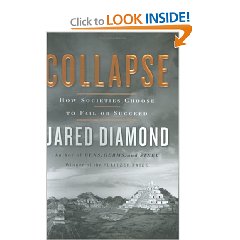The book does not live up to the title, and one wonders if the book was inspired by the edited work Catastrophe & Culture: The Anthropology of Disaster (School of American Research Advanced Seminar Series) whose basic point is that disasters turn into catastrophe when societies fail to plan and adjust.
On balance, I do not recommend the book to anyone that reads widely, and especially in the ecological economics literature from Herman Daly back through E.O. Wilson The Future of Life, Martin Rees OUR FINAL HOUR: A Scientist's warning : How Terror, Error, and Environmental Disaster Threaten Humankind's Future in This Century–On Earth and Beyond, J. F. Rischard High Noon 20 Global Problems, 20 Years to Solve Them, or the more obvious Club of Rome and that Brown guy. Indeed, for the general audience, J. F. Rischard remains the best overview and the best value.
Having said that, I do not discourage the purchase and absorption of this book. Much of it can be skipped through if you have read other books that do a better job on any individual item (to his credit, the author provides an excellent bibliographic review in his expanded notes section). It is largely a kludge of the ideas and investigations of many others, but does–and this is why it gets four stars from me–pull together in one place, in a very interesting manner, a broad variety of investigations and conclusions.
Here are the highlights that I found worthy of reflection:
1) Gives useful emphasis to the word “ecocide” while bringing forward excellent reviews of how “creeping normalcy” and “landscape amnesia” can undermine any perception of danger or urgency.
2) Summarizes, but not as elegantly as J. F. Rischard, 12 problems and a 5-point framework of contributing factors.
3) Focuses on big business as the core player that must reform, but also emphasizes that big business will not reform until the public lives up to its responsibility for changing the rules of the game and making green business profitable.
4) Provides an impressive, nuanced, and helpful view of China and non-traditional threats coming out of China, including invasive plant and animal species, and noxious gases leaving China with the winds.
5) Alarms regarding Australia, the English-speaking outpost in Asia, which appears much more fragile and vulnerable to collapse than generally appreciated.
6) Explores the destructive nature of religious values that cause deforestation or over-population or other ills that impact on the commons.
7) Bluntly relates environmental instability to political instability. Max Manwaring does it better in his edited work “Environmental Security,” but for the general audience, these few pages are important.
8) Provides a concise and helpful thrashing of the 12 or so most common objections to being prudent about our environment.
Deep inside this book, and finally summarized by the author, is a focus on the failure of decision making at all levels of society. A failure to anticipate, a failure to perceive, a failure to attempt remediation, or even if attempted, a failure to achieve remediation, are all failures of each group and its leadership.
The author ends thoughtfully by noting that resolution of our imbalances will come one way or the other. The only choice we have is between peaceful planned sustainable changes, and catastrophic imposed “natural” corrections through war, famine, pestilence, and genocide.
I am very glad to have purchased this book, and would note that it did not make the cut via online browsing, but when examined in an airport bookstore, was found, once in hand and on direct inspection, to be worth the price of purchase and the time to absorb.
Edit of 20 Dec 07. In a larger s trategic context, what I do not see in this book is an emphasis on strategic culture or getting a grip on global reality. The USA has been living on the backs of everyone else, and only now is it starting to sink in that we are part of an The Unconquerable World: Power, Nonviolence, and the Will of the People where everyone is is accutely conscious of The Fifty-Year Wound: How America's Cold War Victory Has Shaped Our World and our The Sorrows of Empire: Militarism, Secrecy, and the End of the Republic (The American Empire Project).
The USA is today (20 Dec 07) a “failed state,” and while it is not officially classified as one, it is relevant to note that in 2007 there are 177 failed states, up from 75 in 2005. Bush-Cheney have been terrible to America, and to the rest of the world. Absent a miraculous turning out of a true majority in 2008, America is headed for a depression.





